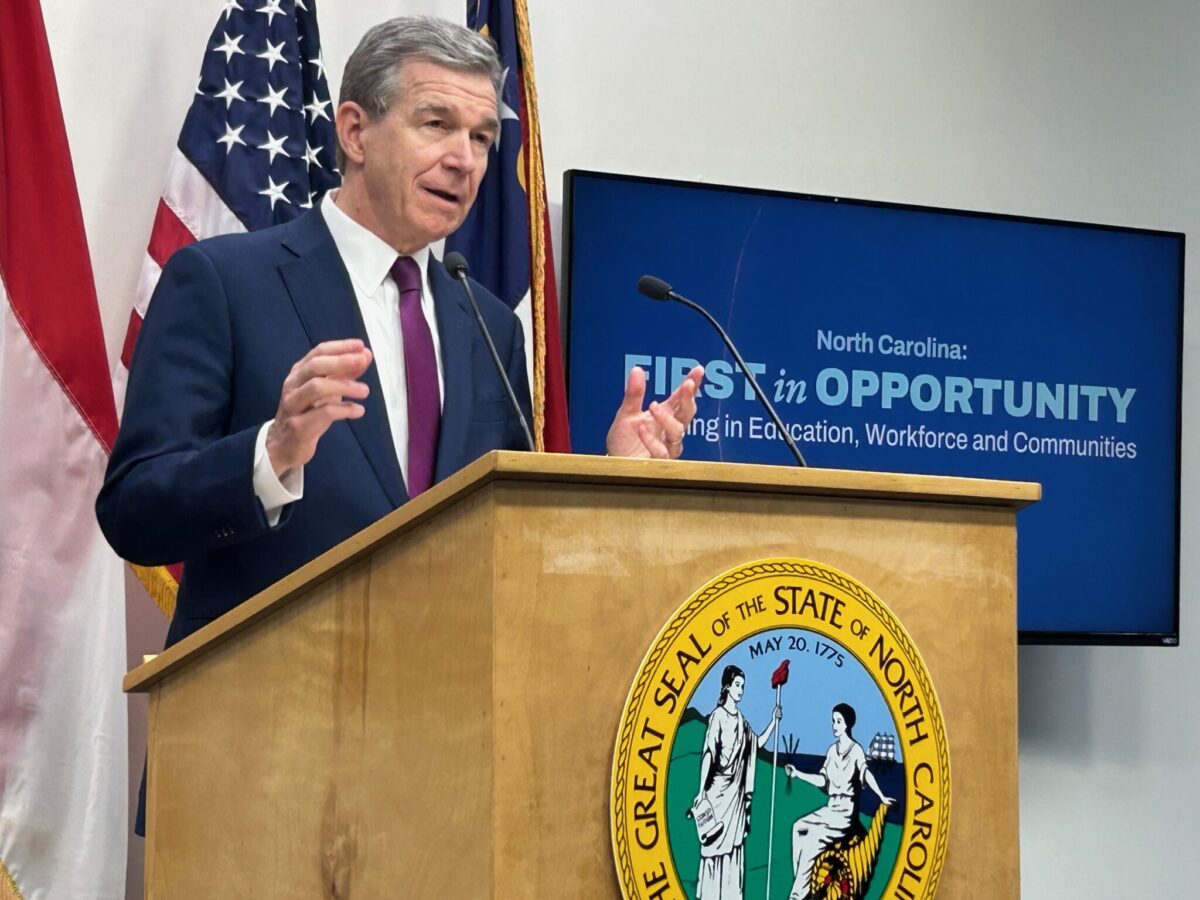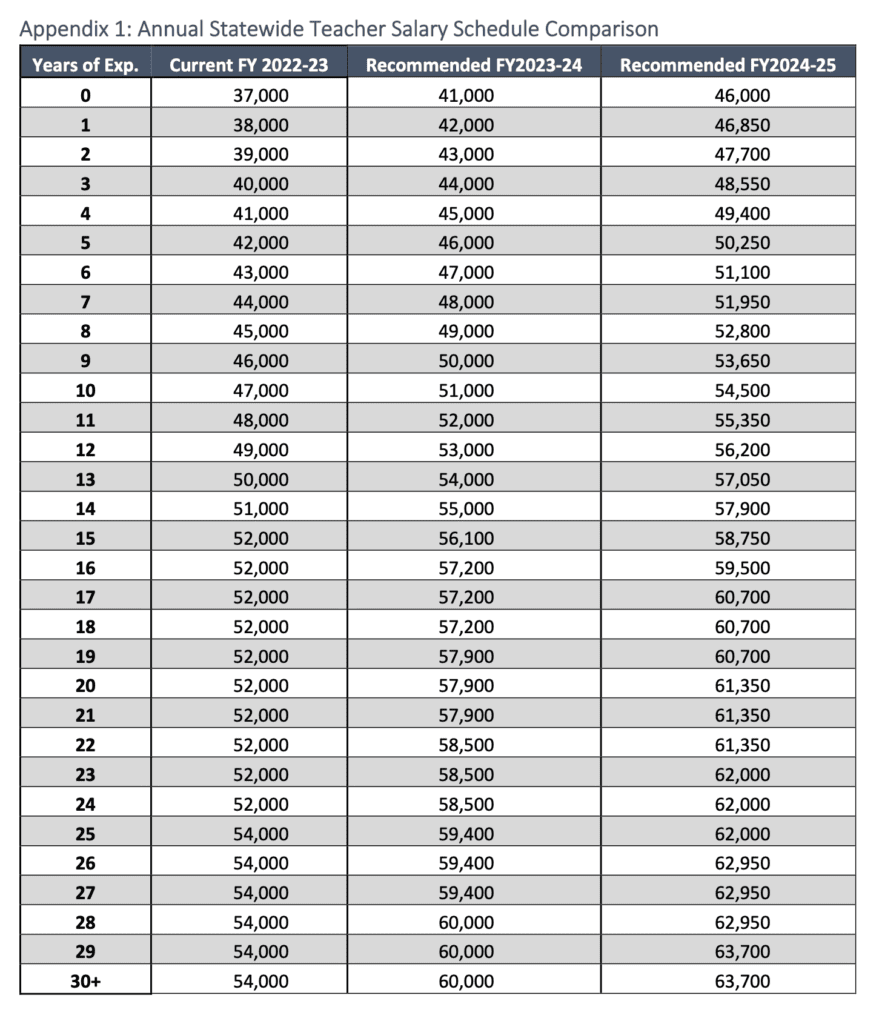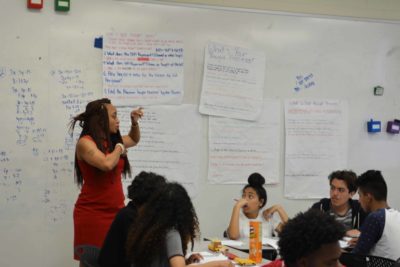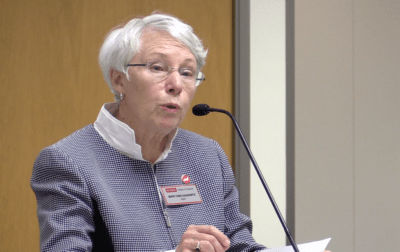
Share this story
- Democratic Gov. Roy Cooper released a budget plan Wednesday that would fully fund the Leandro comprehensive plan and provide average teacher pay raises of 18% over the biennium. Find out what else is in the budget. #nced #ncpol
- “The major focus of my budget is strengthening education, with historic investments from cradle to career. We can and should make good on the constitutional guarantee of a sound basic education," said @NC_Governor of his budget plan.
|
|
Democratic Gov. Roy Cooper released his two-year spending plan during a press conference Wednesday.
Education funding is a major part of the budget proposal. The plan includes full funding for the Leandro comprehensive plan, aimed at getting the state in line with its constitutional duties on education, as well as 16% pay increases for teachers over two years.
“It recognizes that historic investments in education and child care are needed now to make sure we have the well-trained workforce for the jobs of today and tomorrow,” Cooper said of his budget. “The major focus of my budget is strengthening education, with historic investments from cradle to career. We can and should make good on the constitutional guarantee of a sound basic education.”
Cooper’s budget appropriates a total of about $13.4 billion in the first year and $14.3 billion in the second year for the the state Department of Public Instruction (DPI), which is responsible for the bulk of K-12 education items.
The last biennium budget in 2021 spent $10.6 billion on DPI for 2021 and $10.7 billion for 2022. The revised 2022 budget, passed the following year, changed the second year number to a total of $11.3 billion for DPI. So, the budget proposal floated by Cooper for the next two years would be a significant increase in education spending from the prior two years.
And, this is all coming at a time in which the state has projected a $3.25 billion surplus.
Cooper’s plan calls for fully funding year three of the Leandro comprehensive plan. This was a plan ordered by Judge David Lee in a decades-long court case that aims to ensure the constitutional right to a sound, basic education for all students. Additionally, the plan has other line items that, over two years, fully fund years four and five of the comprehensive plan as well. In total, there is $4.5 billion that will fund the comprehensive plan up through year five, according to Cooper.
The Leandro items in the bill are spread across K-12 education, the U.S. Department of Health and Human Services, which largely oversees child care and early education, and the UNC System budgets.
Keep reading to see Cooper’s education funding proposals. You can see the highlights from his education budget below.
Teacher pay raises
Cooper revealed an ambitious plan for teacher pay, which includes a 10% minimum raise for all teachers in the first year of the biennium and a 6% minimum raise in the second year.
In total, the raises amount to an average 18% increase for teachers over the biennium. It’s an average because the new teacher pay schedule includes step increases as well as areas where some teachers receive more than 10% or 6% in an effort to remove plateaus from the teacher salary schedule.
Here is the current salary schedule compared to the pay schedules in years one and two under Cooper’s plan.

“It recognizes that with 5,000 teacher vacancies across our state, we must provide educators with the pay and the respect that they so richly deserve,” Cooper said.
He said these pay increases would take the state from 32nd in the nation on teacher pay to 16th. It would also make North Carolina first in teacher pay in the Southeast.
The State Board of Education and state Department of Public Instruction (DPI) were asking for teacher raises at or above 10% in total.
Other K-12 items
In addition to the funding of Leandro and the teacher pay increases, all teachers would get a bonus of either $1,000 or $1,500 under Cooper’s plan. The higher amount goes to those teachers who make less than $75,000. And these bonuses apply not just to teachers, but to all state employees.
In addition, Cooper’s budget plan restores higher pay for teachers who hold master’s degrees and also provides pay increases for principals of 10% in the first year and 6% in the second year.
Non-certified school personnel, such as bus drivers, would receive a 9.5% pay increase over the biennium, 6.5% in the first year and 3.0% in the second year.
The budget plan includes $10 million in the first year and $10.3 million in the second year recurring for science of reading implementation, and also includes $1.1 million recurring in both years for salary increases for early literacy specialists.
It grants $20 million nonrecurring to DPI for the promotion of innovative practices from districts in the state.
It provides $3 million nonrecurring in both years to help DPI reduce school meal debt around the state.
One of the Leandro-related items funded in the plan is recurring money to offset reduced-price lunch co-pays for students. The funding, $1.1 million recurring in both years in addition to $3.9 million as part of year three of the Leandro plan, would allow an additional 97,500 students to eat for free.
Other items related to the Leandro plan are funding for 1,000 school nurses and/or social workers, 115 school psychologist internship positions, 17 principal turnaround coaches, 1,730 more teacher fellows, and up to 2,709 new teacher assistants.
Cooper’s budget plan also includes $1 billion for public school capital for repairs and construction of school buildings, with each district getting $1 million as a base with the rest of the funding being determined by enrollment.
There is also $50 million to fund school safety grants.
Cooper’s budget would decrease the opportunity scholarship reserve fund by $16 million recurring in the first year and the opportunity scholarship program by $29.7 million recurring in the second year. The decrease in the opportunity scholarship program would also include gradual statutory decreases each year, starting with fiscal year 2024-25. Opportunity scholarships are state funds that are given to qualifying students so that they can attend the private school of their choice. The program is controversial amongst Democrats.
Other items funded in Cooper’s plan related to Leandro include increased funds for low-wealth counties and disadvantaged students, more money for classroom supplies and textbooks, master’s degree pay for social workers, and more money for the DPI department focused on low-performing schools.
Many of DPI’s and the State Board of Education’s budget priorities are fulfilled in Cooper’s budget plan. You can see their priorities here.
Community colleges
Cooper’s proposed budget includes a 5% across-the-board pay increase for community college personnel in the first year. There is an additional 1.5% pay increase in the first year for employees paid on an experienced-based salary schedule (such as faculty) or “with a salary set in law.” In the second year, there is 3% across-the-board for all community college personnel.
The state Community College System (NCCCS) had been asking for a 7% pay increase for faculty over the next two years.
Community college personnel would also get the $1,000 or $1,500 pay bonus that all state employees get, depending on if they make more or less than $75,000.
The NCCCS requested a $232 million increase in state funding over two years, $145.88 million of which would be for student investment. That funding would provide flexible funding to each college to expand program capacity, system leaders have said.
Cooper’s plan does not directly include that $145.88 million line item. It does include $37 million in recurring funding for funding formula increases for community colleges, “helping fund individual colleges’ priorities … including expanding student support services, such as counselors and success coaches, upgrading technology infrastructure, and increasing the number of faculty and staff.” It also includes almost $16 million recurring in both years for enrollment growth adjustments.
There is also $25 million nonrecurring in the first year and $10 million recurring in the second year to fund high-cost workforce programs.
Cooper’s plan budgets $3.8 million recurring in the second year to make permanent the Finish Line grant program. It also has $5.4 million recurring in the second year to make permanent summer accelerator tuition grants, $9.5 million nonrecurring in the first year and $10 million recurring in the second year to make permanent short-term workforce credentials financial assistance, and $6.3 million recurring in both years for the Longleaf Commitment financial aid program. All of these programs were funded previously using federal COVID-19 aid.
Early childhood
In total, Cooper is proposing $1.5 billion in new funding for child care and early childhood education.
Cooper’s plan includes $200 million in the first year and $300 million in the second year for child care stabilization grants when federal pandemic relief funds dry up. They could be used for compensation, bonuses, and start-up costs to open new programs.
As part of its Leandro years four and five funding, the N.C. Department of Health and Human Services (DHHS) would get $5 million recurring in the first year for early intervention services and supports, which help “families with children up to age three with developmental delays and established medical conditions who are currently eligible for the N.C. Infant Toddler Program.”
There is an additional $64 million nonrecurring for this line item, though only about $10 million of that is new money. This funding is in addition to the $10.25 million included on this issue in the funding for the third year of the Leandro comprehensive plan.
The Division of Child Development and Early Education (DCDEE) of DHHS is getting $80 million in both years of the biennium as part of the pot of money being used to fund the third year of the Leandro comprehensive plan.
As part of this funding, the division is getting $32.9 million to raise NC Pre-K slot reimbursement rates, raise administrative rates to 10%, provide startup grants, and increase slots in NC Pre-K.
On top of that, the division is getting an additional $75.1 million in the first year and $150.2 million in the second year recurring for these items from lottery receipts. The budget includes another $300,0000 from lottery receipts in recurring funds each year for state-level staffing for NC Pre-K technical assistance and $16.1 million recurring in the second year from lottery receipts for transportation for NC Pre-K students.
Additionally, there is 5% in the first year to increase compensation for state employees in the Division of Child Development and Early Education, as well as an additional 1.5% for employees paid on an experience-based salary schedule. There is a 3% increase across the board in the second year of the biennium.
Other items funded in the division as part of Leandro comprehensive plan funding include:
- About $24 million in the first year and $20 million in the second year recurring for a birth-3 learning pilot and its evaluation.
- $10 million that will be used to replace nonrecurring federal funds when they run out to increase child care subsidy rates in rural and lower wealth communities, creating a “statewide rate floor.” That means child care providers participating in the subsidy program would receive whichever is higher: the county rate set by the state or the state average rate. Subsidy rates are based on biannual market rate surveys.
- Another $102.4 million in the first year and $204.8 million in the second year recurring to support Smart Start, a network of 75 local partnerships that support local early childhood programs and provide services to children and families. For the biennium, the budget requires DCDEE to set aside $90 million of these funds each year to fund the subsidy floor.
- $26 million for Leandro plan year three for statewide expansion of the Child Care WAGE$ program. And then an additional $1.5 million in the first year and $3 million in the second year recurring for this program. The budget states this would expand the wage-based supplements to an additional 4,000 teachers and make the program available in all 100 counties.
- $26.2 million in the first year and $52.4 million in the second year in recurring funds to expand Family Connects, a home visiting program.
- $1.25 million from year three of the Leandro plan for child care workforce recruitment, and then an additional $1.55 million in the first year and $3.05 million in the second year recurring for this program.
- $5 million recurring in each year to scale up a program that strengthens transitions between pre-K and kindergarten.
- $650,000 recurring and $500,000 nonrecurring in the first year, and $900,000 recurring in the second year for strengthening early childhood data systems, training local personnel on how to use early childhood data, and implementing a real-time process to identify children eligible for early childhood programs.
Reaction from legislative leaders
Both Senate President Pro Tem, Phil Berger, R-Rockingham, and House Speaker Tim Moore, R-Cleveland, released statements critical of Cooper’s budget plan shortly after he released it.
Berger said:
“This is an irresponsible, unserious proposal from a lame-duck governor who wants future North Carolinians to pick up his tab. Gov. Cooper wants to go on a reckless spending spree by raising taxes, raiding the state’s savings account, and proposing the largest increase in year-over-year spending in the state’s history. He is following the same failed Democratic playbook that is causing residents to flee blue states like New York, California, and Illinois.”
And Moore said:
“Gov. Cooper’s budget proposal takes the same reckless approach to spending that his fellow Democrats have taken in Washington. Unfortunately, this kind of runaway spending has resulted in a failing economy that has left millions of Americans behind.
“The General Assembly will continue on the fiscally responsible path that has made our state attractive to so many. Now Gov. Cooper is proposing a budget that effectively eliminates the tax cuts that will help North Carolinians make ends meet and have attracted families and businesses to our state. Over a decade of Republican budget leadership has put North Carolina on solid financial ground. This is no coincidence — our fiscally responsible approach to spending works.”
Now that Cooper’s budget is out, it is up to the House to release its plan next, followed by the Senate. The two chambers will then hash out their differences before sending their plan over to Cooper.
Go here for Cooper’s full budget.
Editor’s note: This article was updated to clarify that the early childhood raises apply to state employees.





